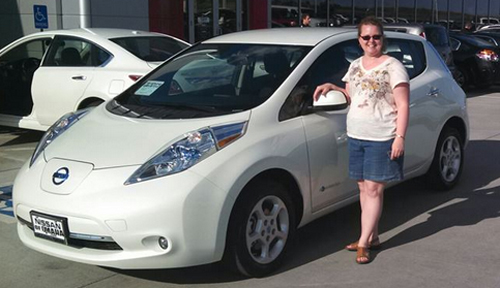Tammy Dawdy from the Olsen Center for Women’s Health drives a Nissan Leaf.
Why is this of interest to you? It doesn’t use any gas.
None. Zip. Zilch. Nada. No gas, at all, ever.
This makes the Leaf pretty unique in the American car market as most “electric” cars are actually hybrids, switching from electricity to gas based on what the car is doing or for longer trips.
Still skeptical? We asked Tammy for her take:
|
Tammy: My husband and I have been interested in this for years but the technology has been cost prohibitive. When our current vehicle, a Tahoe, needed to be replaced we got a Leaf. It was a great decision; it gets us everywhere we need to go, drives like a sports car (just ask the Porsche I passed on the way to work!), and I never have to stop at the gas station!
LiveGreen: How have your utility bills changed since purchasing a Leaf?
Tammy: I drove the Tahoe to work, to take kids to school/activities, and to run errands and was spending about $400 a month on gasoline. If I drain the battery all the way down each day, which never happens — even on days I put on 80-plus miles — and charge it fully each day, I would spend $2.50 a day on electricity for the car. Yep, $2.50 — less than the price of one gallon of gas. The savings in gasoline for just 2 weeks is our car payment!
(You can calculate your gas savings with a Leaf or Tesla.)
LiveGreen: What’s the best part about owning a Leaf?
Tammy: I love to drive it and the savings are great too! But I love having cutting edge technology and educating others about EVs. They are new to Omaha and many people have misconceptions about driving an EV so it’s fun to talk to them about it.
LiveGreen: Would you recommend a Leaf (or other electric car) to others?
Tammy: Yes! And people should know that it’s very doable in Omaha — I drive my kids from one end of town to the other and have never been stranded. Most people seem to have “range anxiety” but it’s not a big deal or prohibitive in any way.
Want more information? Check out this information on fuel economy, new vehicles, and tax incentives.

Some employees commuting from longer distances would need to charge their EVs while at work? Does UNMC have any charging stations on campus?
I think that the cost savings is a great thing and the fact that it is not using fuel is wonderful for the environment, however, not all of us have these kind of cars or have the resourses to switch over. I see they have been putting in outlets and they can "plug" into the university electricity. Our rates for parking have been raised and we just have had notices about watching our costs as we are trying to cut costs here at work. If many people had these would this not add to our university costs at $2.50 per day per car?
How is this car different from my car? Mine uses gas but I can tell it still uses electricity because I listen to the radio on my way to work (love Backstreet Boys!). And it has a light that goes on when I open the door. Thanks for your help!
Jolene,
Your car’s engine runs on gasoline and has a battery that also helps to power your auxiliary items like lights and the radio. This battery charges as the engine runs. An all-electric car does not use any gasoline and has a much bigger battery that powers the engine as well as the auxiliary items.
JoAnn and Rod,
As you noted, not having emissions from gasoline powered vehicles is great for the environment, and the lack of emissions is also great for the health of people in Omaha and the surrounding area. Cleaner air leads to fewer lung complications and infections, and can help with other health problems as well. Improving the public’s health is part of UNMC’s mission.
UNMC does not currently have any charging stations, but does have a few outlets that students and employees with valid parking permits may use. They are free of charge—Facilities has agreed to pay for this minimal cost (UNMC currently has 4 electric vehicles on campus) to help promote the use of alternative vehicles. They can do this with the money they have saved with recent energy upgrades and they are using existing infrastructure—nothing was installed. This cost is no different from UNMC paying to power microwave ovens and refrigerators for employee lunches, or for people to charge personal cell phones.
In case you are curious, many universities have charging stations installed for their parking customers. Here are a few:
University of Michigan:
https://pts.umich.edu/alternative_transportation/ev_charge.php
University of Iowa:
http://facilities.uiowa.edu/uem/renewable-energy/solar-energy.html
Texas A&M University:
http://transport.tamu.edu/Alternative/ev.aspx
University of Minnesota Duluth:
https://umdsustain.wp.d.umn.edu/ev-charging-station/
Thank you for your comments, please let livegreen@unmc.edu know if you have any additional questions!